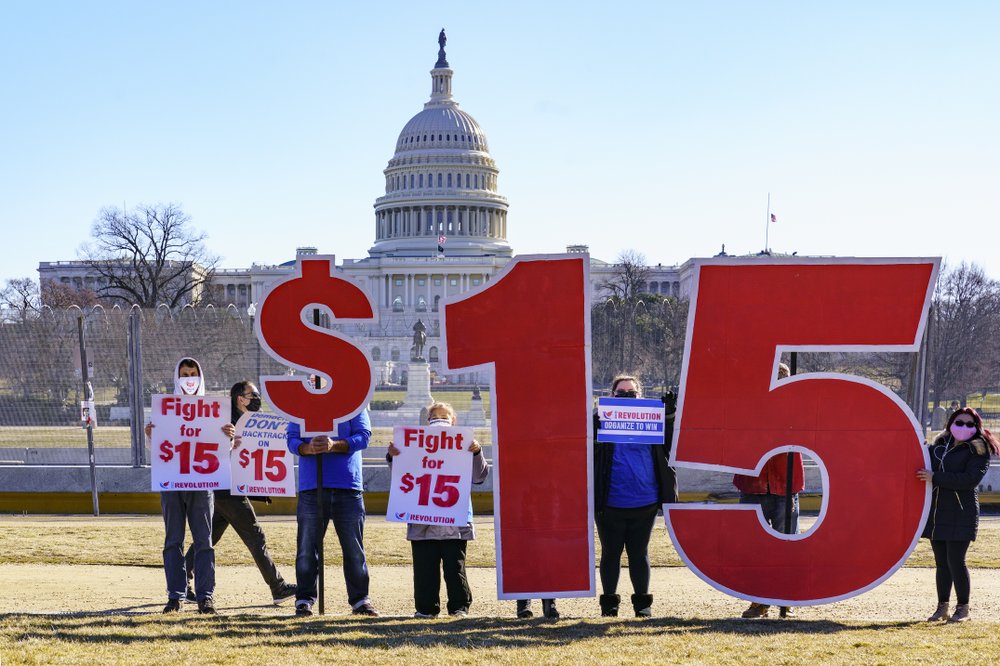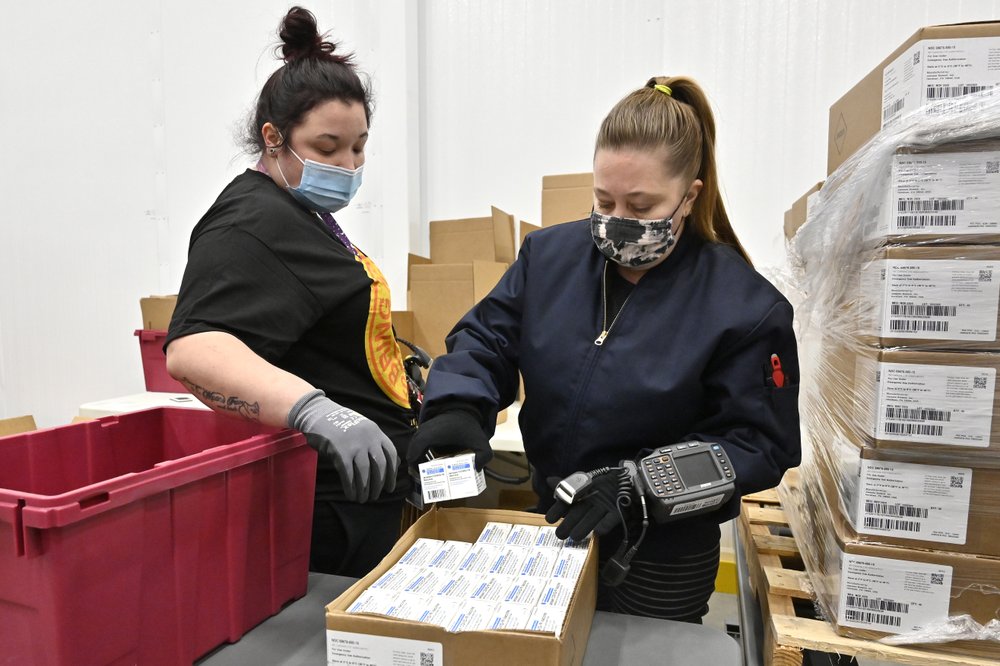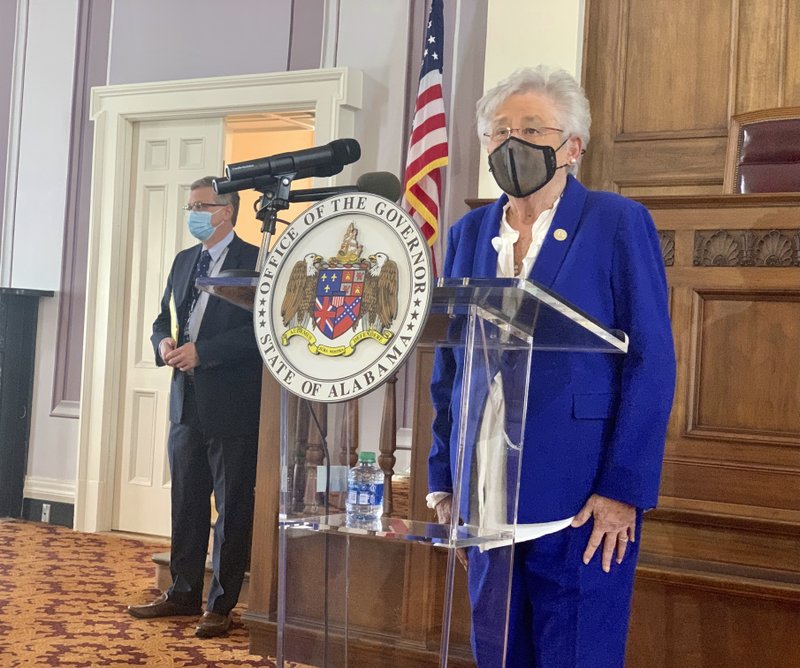Minimum wage hike all but dead in big COVID relief bill

Democrats’ hopes of including a minimum wage increase in their $1.9 trillion COVID-19 relief bill seemed all but dead Monday as the Senate prepared to debate its own version of the House-passed aid package. Four days after the chamber’s parliamentarian said Senate rules forbid inclusion of a straight-out minimum wage increase in the relief measure, Democrats seemed to have exhausted their most realistic options for quickly salvaging the pay hike. In one decision, they abandoned a potential amendment threatening tax increases on big companies that don’t boost workers’ pay to certain levels. “At this moment, we may not have a path but I hope we can find one” for pushing the federal pay floor to $15 an hour, said No. 2 Senate Democratic leader Richard Durbin of Illinois. Senate Democrats hope to unveil their version of the broad relief package and begin debate as early as Wednesday. Congressional leaders want to send President Joe Biden the legislation combating the pandemic and bolstering the economy by March 14, the date emergency jobless benefits that lawmakers approved in December expire. The overall relief bill is Biden’s biggest early legislative priority. It looms as an initial test of his ability to unite Democrats in the Senate — where the party has no votes to spare — and risks lasting damage to his influence should he fail. Republicans are strongly against the legislation and could well oppose it unanimously, as House GOP lawmakers did when that chamber approved the bill early Saturday. The measure would provide $1,400 payments to individuals plus hundreds of billions of dollars for schools and colleges, COVID-19 vaccines and testing, mass transit systems, renters, and small businesses. It also has money for child care, tax breaks for families with children, and assistance for states willing to expand Medicaid coverage for low-income residents. Senate Budget Committee Chairman Bernie Sanders, I-Vt., said he wanted Democrats to ignore the parliamentarian’s ruling blocking the minimum wage increase. He also wants them to vote to eliminate filibusters — procedural delays that would take an unachievable 60 votes for Democrats to prevail. Neither idea seemed to have the support among Democrats or the White House needed to succeed. But Sanders, the Senate’s lead sponsor of the hike to $15, said he’d force a vote on an amendment restoring the minimum wage increase anyway. “This is the soul of the Democratic Party,” he said of the proposal. In an acknowledgment that his effort might fall short, he said, “If we fail in this legislation, I will be back” and offer it in the near future. The Senate is divided 50-50 between the parties with Vice President Kamala Harris able to cast only tie-breaking votes. Democrats are employing a seldom-used procedure for the COVID-19 relief bill that will shield the measure from filibusters. Biden discussed the relief bill Monday in a virtual meeting with nine Senate Democrats, including Joe Manchin of West Virginia, an opponent of the $15 hourly target. A White House statement said the group was “united in the goal of quickly passing a significant package that reflects the scope of the challenges our country is facing.” Democrats, who will need unanimity to pass the legislation, are pushing for several changes in the House measure. Manchin told reporters he wants the bill’s emergency unemployment benefits, set at $400 weekly by the House, to revert to the current $300 figure enacted in December. That is certain to be divisive and draw strong opposition from progressives. He and Sen. Jon Tester, D-Mont., also said they want spending to be better “targeted,” which Manchin said meant “helping the people that need help the most.” Republicans have said the legislation is too costly and spends money needlessly. Sen. Angus King, I-Maine, said he wants the bill’s $350 billion for state and local governments to specify minimum amounts for municipal governments and wants perhaps $50 billion to improve broadband coverage. The parliamentarian ruled Monday that some House-approved provisions, which would provide billions to help some struggling pension plans and to help people who’ve lost jobs afford health insurance, could stay in the bill, according to Senate Finance Committee Chairman Ron Wyden, D-Ore. The House-approved minimum wage language would gradually raise the federal floor to $15 an hour by 2025, more than double the $7.25 in place since 2009. After the parliamentarian said that provision would have to be deleted, Sanders and Wyden said they were working on plans to increase taxes on large corporations that don’t meet certain levels for workers’ pay. But that plan was dropped, Democrats said Monday, with Sanders saying the proposal would have been too easy for employers to evade. It was always questionable whether pressuring companies with tax increases would have won enough Democratic support to survive, and the idea would have affected only a fraction of workers paid the minimum wage. Raising the minimum wage has broad support among Democrats. But while it’s embraced passionately by the party’s progressives, at least two Senate moderates — Manchin and Kyrsten Sinema of Arizona — have voiced opposition to including it in the broader relief measure, wounding its prospects and fostering tensions within the party. Democrats must now decide “how we do minimum wage as part of another piece of legislation or on its own,” said Sen. Richard Blumenthal of Connecticut. While eliminating filibusters or overruling the parliamentarian has strong support among progressives, the ideas lack appeal to moderates. They are wary of erasing procedures that the party has used in the past, and could use again, to protect its priorities when it is in the minority. Among those who’ve long supported retaining the filibuster is Biden, who served nearly four decades in the Senate. “The president’s view on the filibuster is well known. He has not changed that point of view,” White House press secretary Jen Psaki said pointedly Monday. Republished with the permission of the Associate Press.
States easing virus restrictions despite experts’ warnings

With the U.S. vaccination drive picking up speed and a third formula on the way, states eager to reopen for business are easing coronavirus restrictions despite warnings from health experts that the outbreak is far from over and that moving too quickly could prolong the misery. Massachusetts on Monday made it much easier to grab dinner and a show. In Missouri, where individual communities get to make the rules, the two biggest metropolitan areas — St. Louis and Kansas City — are relaxing some measures. Iowa’s governor recently lifted mask requirements and limits on the number of people allowed in bars and restaurants, while the town of Lawrence, home to the University of Kansas, now lets establishments stay open until midnight. Mike Lee, who owns Trezo Mare Restaurant & Lounge in Kansas City, said he hopes increased vaccine access, combined with warmer weather, will improve business. “I think that people are excited to put this past them and be able to start to get back to their ways of doing things,” Lee said. The push to reopen comes as COVID-19 vaccine shipments to the states are ramping up. Nearly 20% of the nation’s adults — or over 50 million people — have received at least one dose of vaccine, and 10% have been fully inoculated 2 1/2 months into the campaign to snuff out the virus, according to the Centers for Disease Control and Prevention. Johnson & Johnson shipped out nearly 4 million doses of its newly authorized, one-shot COVID-19 vaccine Sunday night to be delivered to states for use starting on Tuesday. The company will deliver about 16 million more doses by the end of March and a total of 100 million by the end of June. That adds to the supply being distributed by Pfizer and Moderna and should help the nation amass enough doses by midsummer to vaccinate all adults. The White House is encouraging Americans to take the first dose available to them, regardless of manufacturer. In New York City, where limited indoor dining has resumed, officials said the J&J vaccine will help the city to inoculate millions more people by summer, including through door-to-door vaccinations of homebound senior citizens. But the efforts come with strong warnings from health officials against reopening too quickly, as worrisome coronavirus variants spread. On Monday, the head of the CDC, Dr. Rochelle Walensky, urgently warned state officials and ordinary Americans not to let down their guard, saying she is “really worried about reports that more states are rolling back the exact public health measures that we have recommended.” “I remain deeply concerned about a potential shift in the trajectory of the pandemic,” she said. “We stand to completely lose the hard-earned ground that we have gained.” Cases and hospitalizations have plunged since the end of January, and deaths have also dropped sharply, but they are still running at dangerously high levels and have even risen slightly over the past several days. “We cannot be resigned to 70,000 cases a day and 2,000 daily deaths,” Walensky said. Overall, the outbreak has killed more than a half-million Americans. The vaccine already is contributing to a decrease in severe cases and deaths among older people, and is “quickly becoming a bigger contributor” nationally, Justin Lessler, an expert in infectious diseases at Johns Hopkins University, said in an email. “I suspect we will see it overtake natural infection as the biggest driver of immunity late spring earliest, more likely midsummer,” Lessler said. Dr. Amesh Adalja, an infectious disease specialist at Johns Hopkins University, said he believes states and cities have leeway to ease some restrictions because hospitals no longer are at capacity in most communities. But “I do think that masks are likely going to need to be kept in place for some time until we get more of our vulnerable populations vaccinated,” he said. “It is important for restaurants who are increasing their capacity to remember that we are still in a pandemic and to continue to follow some of those rules,” Adalja said. The Biden administration wants to see all three vaccines distributed evenly, while also acknowledging that the easy-to-handle J&J vaccine will be used in pop-up mobile sites and locations without freezer storage capacity. States are hoping that the surging vaccine supply will help tamp down new infections. In Massachusetts, Gov. Charlie Baker lifted restaurant capacity limits entirely. Theaters can open at 50% capacity, with a maximum of 500 people. And capacity limits across all businesses have been raised to 50%. Las Vegas on Monday became the latest of the nation’s largest school districts to return children to classrooms. Pre-K children to third graders will go back two days a week, with other grades to be phased in by early April. And in California, Gov. Gavin Newsom and legislative leaders reached an agreement aimed at getting most children back in classrooms by the end of March. Under the deal announced Monday, school districts could receive up to $6.6 billion if they reopen by March 31. The U.S. ranks fourth in the world, behind Israel, the United Arab Emirates, and Britain, in the number of doses administered relative to the population, according to data compiled by the University of Oxford. President Joe Biden fell well short of his goal of setting up 100 new federally operated mass-vaccination sites by the end of February, with just seven up and running. White House vaccination coordinator Jeff Zients also acknowledged that scheduling of vaccination appointments “remains too difficult in too many places.” But he said the White House is working with states to improve scheduling systems and is exploring federal support for call centers to make it easier for people to get appointments. Republished with the permission of the Associated Press.
John Wahl elected chairman of Alabama Republican Party

John Wahl, a butterfly farmer and a state GOP officer, was elected Saturday as the new chairman of the Alabama Republican Party. Wahl replaces longtime chairwoman Terry Lathan who did not seek a fourth term. “I believe it’s important for the Republican Party to stand for the conservative values we are based upon and defend the God-given rights of every individual,” Wahl said in a statement issued through the party. “We are the party of free speech, equal rights, family values, and fair elections. A lot of these values are under attack right now, and I am committed to defending them as chairman of the Alabama Republican Party.” Wahl previously served as the ALGOP senior vice chairman. He was a member of Sen. Tommy Tuberville’s transition team. “Very excited for my friend John Wahl as he takes on the chairmanship of the @ALGOP. He is going to do a fantastic job and I look forward working with him,” Tuberville wrote on Twitter. Wahl raises butterflies for zoos, botanical gardens, and exhibits. Republished with the permission of the Associated Press.
Hospital group supports mask order extension in Alabama

Hospitals support an extension of a statewide face mask order, at least until more people become vaccinated against COVID-19, the head of the Alabama Hospital Association said Monday. Alabama Gov. Kay Ivey is expected to announce this week whether she will extend the face-covering mandate and other health orders that are set to expire Friday. The mandate has been in place since July and has been extended several times. A spokeswoman for the governor expressed optimism about state virus numbers and said the governor will provide an update soon. “All along, Governor Ivey has made clear that she prefers personal responsibility to government mandates. We are optimistic that our state is heading in the right direction, and we still have some work to be done,” Ivey spokeswoman Gina Maiola said Monday. Alabama, like much of the nation, has seen a significant drop in daily COVID-19 cases, but medical officials cautioned that the virus has not gone away, and uncertainty remains about the impact of emerging variants and upcoming events like spring break gatherings. “It just seems to me until we get more people vaccinated, the most prudent thing to do is to stay the course and continue to try to drive these numbers down, especially because we are still worried about the U.K. variant and the South African variant,” said Dr. Don Williamson, the former state health officer who now heads the Alabama Hospital Association. The number of COVID-19 patients in Alabama hospitals has dropped from 3,081 on Jan. 5 to 651 this week. The seven-day rolling average of daily new cases in Alabama has dropped from about 4,280 on Jan. 10 to under 915 on Sunday, according to The COVID Tracking Project. “All of the numbers are going in the right direction,” Williamson said. As of Monday, nearly 618,000 people in the state of 4.7 million people had at least one dose of the vaccine — about 13% of the total population. Republished with the permission of the Associated Press.


